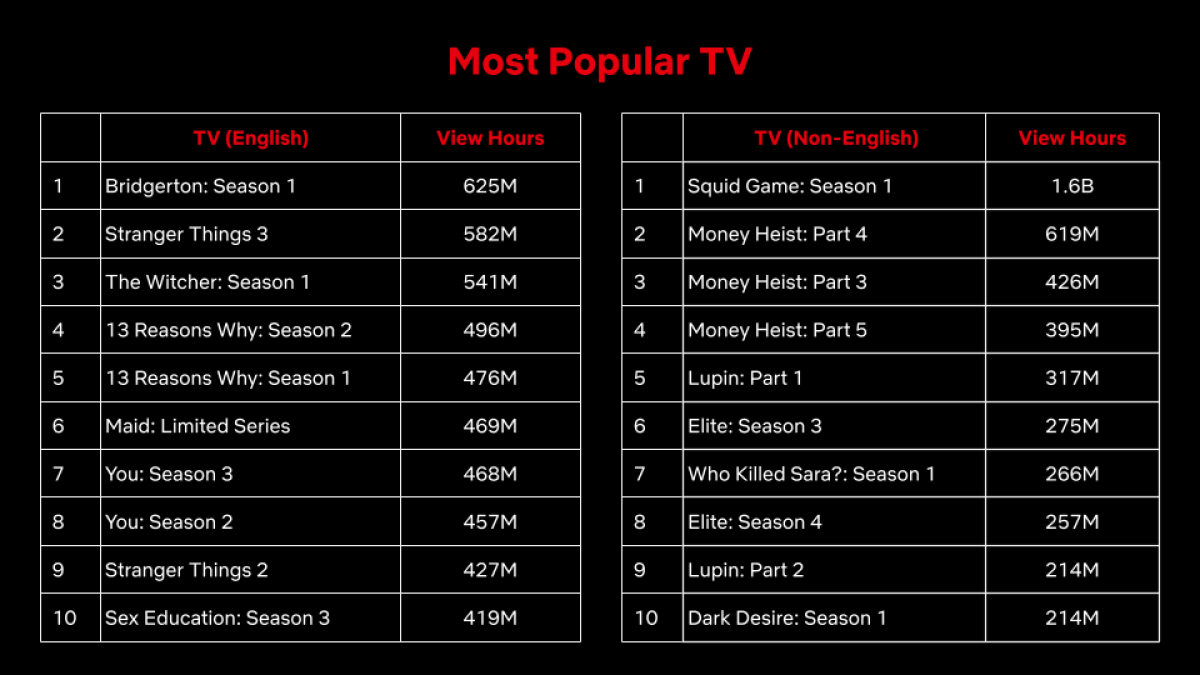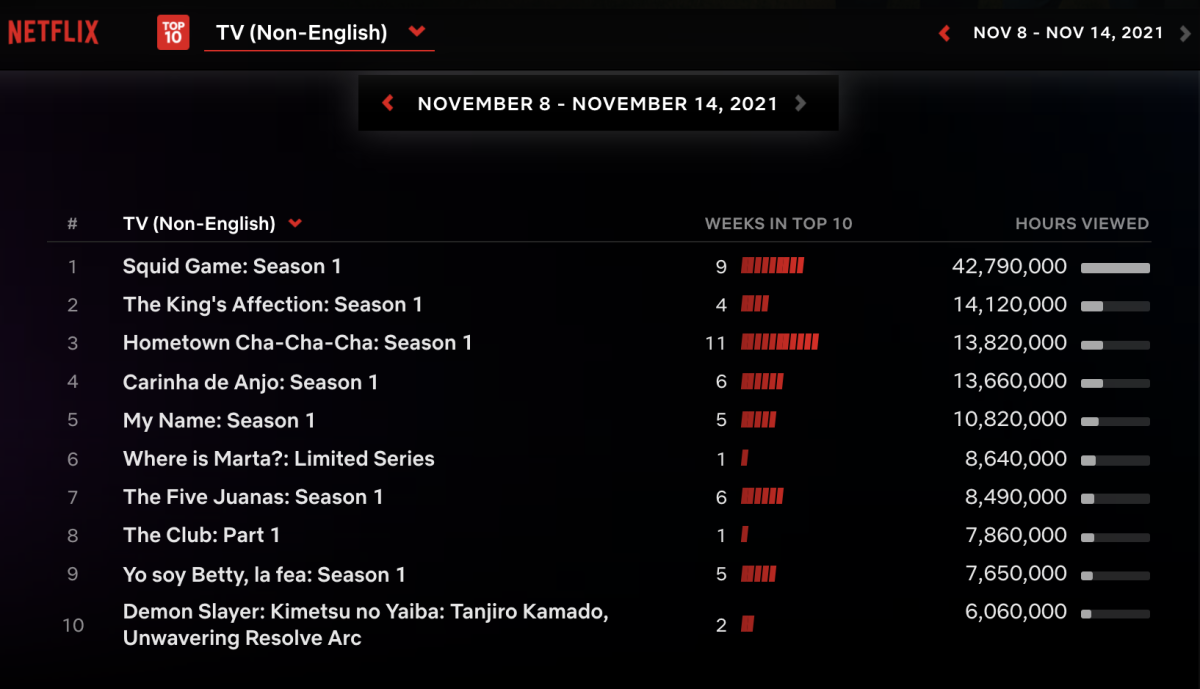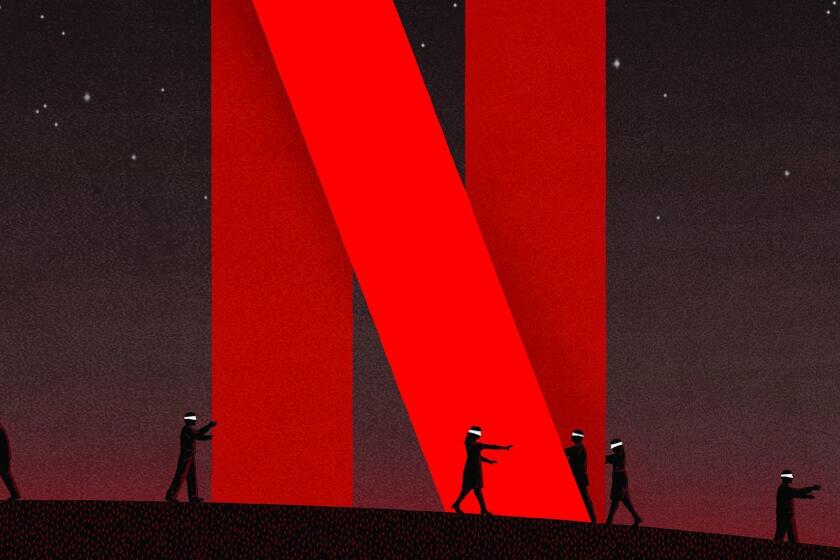Netflix releases weekly list of top shows by viewing hours

Netflix on Tuesday began rolling out weekly reports on top shows and movies by number of hours viewed on the streaming service after receiving feedback that it should be more transparent.
The data, released on Top10.Netflix.com, breaks out the streamerâs top 10 movies and shows worldwide by English and non-English titles and number of hours viewed.
âThis is an important step forward for Netflix, the creators we work with and our members,â Pablo Perez De Rosso, the companyâs vice president of content strategy, planning and analysis, said in a blog post. âPeople want to understand what success means in a streaming world, and these lists offer the clearest answer to that question in our industry.â
The most watched show on Netflix worldwide in its first 28 days was the Korean-language thriller âSquid Game,â racking up 1.6 billion hours in viewing time and topping the non-English TV list. For English-language series, the Regency era romance âBridgertonâ ranked first, with 625 million hours watched in its first 28 days.

For the week of Nov. 8 to 14, âSquid Gameâ continued to dominate, with 42.79 million hours viewed for non-English TV, followed by Season 1 of the Korean-language romance series âThe Kingâs Affection,â Netflix said.
For English-language TV, Season 3 of âNarcos: Mexicoâ ranked first with 50.29 million hours viewed.
The top English-language film last week was the action movie âRed Notice,â starring Gal Gadot, with 148.7 million hours viewed. The romantic comedy âLove Hardâ ranked second, with 58.56 million hours watched.

Netflix will also show top 10 lists for movies and films that are geographic specific to more than 90 countries, but will not show hours viewed for country-specific lists.
Itâs uncertain whether other streaming services will follow in Netflixâs lead.
Streamers in the past have not been open about sharing viewership data with all their partners, considering it proprietary information. Over the years, Amazon and Netflix have shared some data publicly, but they have been criticized for cherry-picking only the programs that perform well.
When it comes to ratings, Netflix treats the public and many of its business partners like the characters in âBird Boxâ â blindfolded and left to feel their way through the dark, except for a rare glimpse of light.
The lack of information has made it challenging for sellers to figure out how much their project is worth and for talent to make sure they are getting paid fairly.
âStreamers arenât anxious to share all of their data,â Richard Lovett, co-chairman of Creative Artists Agency, said at a Wall Street Journal Tech Live conference in October. âThey will share some sometimes. We hope we will find a way to understand the partnership in a better way where more data is shared. In the meantime, weâve got to work really, really hard for our clients so that we will fight for their value and for them to be paid fairly.â
Earlier this year, CAA client Scarlett Johansson sued the Walt Disney Co., accusing the company of reneging on a deal to show action movie âBlack Widowâ exclusively in theaters for a window of time during the COVID-19 pandemic. Instead, Disney released the movie in theaters and on its streaming service the same day. Both sides settled their dispute in September.
PLUS: Peacock gets eyeballs. But Olympics viewers are confused.
Netflix has made efforts over time to be more transparent about its viewership data. Last year, it rolled out country-specific top 10 lists to help guide viewers on whatâs popular on the streaming service.
The company has also tweaked its viewership metrics. Netflix once defined a view as one person watching at least 70% of a program, but that changed in January to at least two minutes of a program.
Netflix has since abandoned that metric, saying that hours watched is a better indicator of user engagement and consistent with how outside services measure TV viewing.
More to Read
Inside the business of entertainment
The Wide Shot brings you news, analysis and insights on everything from streaming wars to production â and what it all means for the future.
You may occasionally receive promotional content from the Los Angeles Times.













